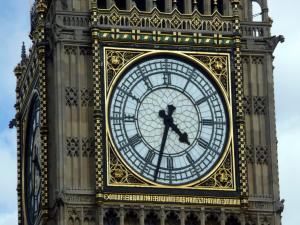
By Patrick Daly
Boris Johnson's Brexit deal could force Northern Ireland to operate in a different time zone to the rest of the UK for half the year, peers have warned.
The European Parliament voted last year in support of a proposal that would put an end to the twice-yearly changing of the clocks to accommodate extra daylight hours.
Under an EU directive, all 27 states currently switch to summer time hours on the last Sunday of March and back to Greenwich Mean Time (GMT) on the last Sunday of October - a pattern the UK follows.
But under a potential swap by Brussels to a "double summer time" arrangement, Lords have warned that the Prime Minister's Withdrawal Agreement could see Northern Ireland legally obliged to be one hour ahead for six months every year.
It would mean the 1.8 million people living in the six counties would follow summer time hours, even when those in Great Britain wind their clocks back by 60 minutes in the autumn.
The fears over an obligation for Northern Ireland to follow Brussels' lead if the EU does adopt double-summer time stem from Mr Johnson's Brexit deal, which signed Northern Ireland up to continuing to follow EU rules on goods and agriculture in order to prevent a hard border.
Any EU-wide shift in timekeeping would apply to Ireland and, due to the terms of the PM's divorce treaty, Northern Ireland might have to follow suit, peers have suggested.
"Were this proposal (for double summer time) to become EU law under its current single market legal basis, Northern Ireland may be obliged under the terms of the Withdrawal Agreement and the protocol on Ireland/Northern Ireland to align with the EU and thus institute a time border with Great Britain," said the Lords' EU internal market sub-committee in its report, Clock changes: is it time for change?
The group of cross-party peers have called on the Government to "give urgent further consideration" to the impact the Brexit agreement could have if the EU does decide to make the summer time switch permanent - and criticised ministers' lax approach to what could be a significant change for the UK.
"Our inquiry has demonstrated that any such decision at EU level would have implications for the UK, notwithstanding UK withdrawal from the EU," wrote the peers.
"The nature and significance of such implications is not, however, well understood - not least by the Government."
Baroness Donaghy, chair of the committee, said there was also the possibility that Ireland could face a situation where it has different time-zones on either side of the border.
"So far the Government has stuck its head in the sand on the EU Commission's proposal, hoping that it goes away," she said.
"However, if it doesn't, we could be caught unaware and unprepared to make a decision, leaving the island of Ireland with two time zones at different times of the year and causing difficulties for people and businesses in Northern Ireland."
The report, published on Tuesday, praised ministers' "informal engagement" with counterparts in Northern Ireland on the issue, but pushed for a more detailed review to take place.
Peers recommended reviewing research carried out in countries that have different time zones, and identify the possible implications of time zone changes for both domestic and international businesses.
Business minister Kelly Tolhurst, giving evidence to the committee last year, said: "Anything that would create a time border in Northern Ireland we are completely opposed to, and so is the Irish government."
The proposal to scrap the bi-annual time-switch across the Continent derived from a citizens' forum carried out by the EU.
The consultation, undertaken when the UK was still a member, received 4.6 million responses, 84% of which were in favour of abolishing the clock change practise.
But peers noted that the respondents accounted for less than 1% of the EU population, and 70% of those responses came from Germany alone.


 Gerry Adams awarded 100,000 euro in damages after suing BBC for libel
Gerry Adams awarded 100,000 euro in damages after suing BBC for libel
 Victim held in room while masked men ransack Saintfield home
Victim held in room while masked men ransack Saintfield home
 Nesbitt not surprised if ‘devastating’ culture in RVH report repeated elsewhere
Nesbitt not surprised if ‘devastating’ culture in RVH report repeated elsewhere
 Pensioner, 82, killed in crash near Omagh
Pensioner, 82, killed in crash near Omagh
 Kneecap announce new song ahead of headline performance at London’s Wide Awake
Kneecap announce new song ahead of headline performance at London’s Wide Awake